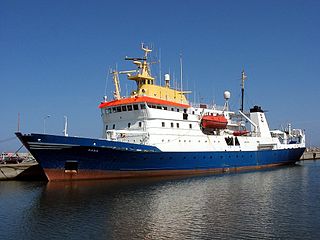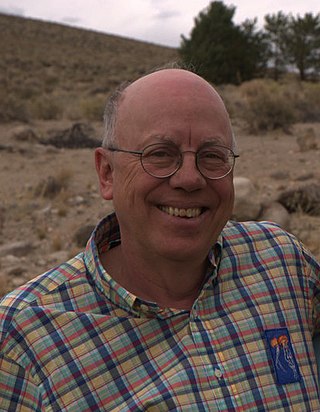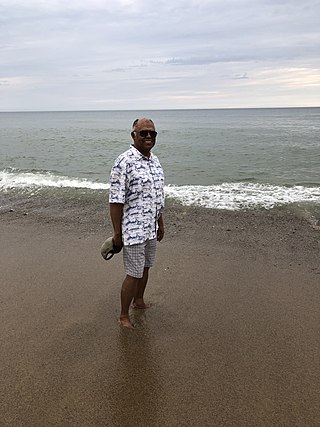Fred Utter (November 25, 1931 - March 5, 2023) was an affiliate professor in the School of Oceanography at the University of Washington. [1]
Utter was recognized by NOAA in 2006 as one of their 26 history makers over the preceding 200 years, and characterised as the founding father of fishery genetics. [2]
In 1959 Utter began work in the ancestor laboratory of the NOAA Northwest Fisheries Science Center fishery genetics laboratory, of which he became the head in 1969. He led the genetics group until he retired from NOAA in 1988. During retirement, he served as editor of the North American Journal of Fisheries Management and Transactions of the American Fisheries Society, as well as being a member of the Interior Columbia River Technical Recovery Team. [3]
Utter authored or coauthored over 100 scientific publications, [1] [3] [4] and co-edited the book Population Genetics and Fishery Management. [5]

The National Oceanic and Atmospheric Administration is a scientific and regulatory agency within the United States Department of Commerce that forecasts weather, monitors oceanic and atmospheric conditions, charts the seas, conducts deep sea exploration, and manages fishing and protection of marine mammals and endangered species in the U.S. exclusive economic zone.

The United States Fish and Wildlife Service is an agency within the United States Department of the Interior dedicated to the management of fish, wildlife, and natural habitats. The mission of the agency is "working with others to conserve, protect, and enhance fish, wildlife, plants and their habitats for the continuing benefit of the American people."
Steelhead, or occasionally steelhead trout, is the common name of the anadromous form of the coastal rainbow trout (Oncorhynchus m. irideus) or Columbia River redband trout. Steelhead are native to cold-water tributaries of the Pacific basin in Northeast Asia and North America. Like other sea-run (anadromous) trout and salmon, steelhead spawn in freshwater, smolts migrate to the ocean to forage for several years and adults return to their natal streams to spawn. Steelhead are iteroparous, although survival is approximately 10–20%.

Fisheries science is the academic discipline of managing and understanding fisheries. It is a multidisciplinary science, which draws on the disciplines of limnology, oceanography, freshwater biology, marine biology, meteorology, conservation, ecology, population dynamics, economics, statistics, decision analysis, management, and many others in an attempt to provide an integrated picture of fisheries. In some cases new disciplines have emerged, as in the case of bioeconomics and fisheries law. Because fisheries science is such an all-encompassing field, fisheries scientists often use methods from a broad array of academic disciplines. Over the most recent several decades, there have been declines in fish stocks (populations) in many regions along with increasing concern about the impact of intensive fishing on marine and freshwater biodiversity.

The Atlantic salmon is a species of ray-finned fish in the family Salmonidae. It is the third largest of the Salmonidae, behind Siberian taimen and Pacific Chinook salmon, growing up to a meter in length. Atlantic salmon are found in the northern Atlantic Ocean and in rivers that flow into it. Most populations are anadromous, hatching in streams and rivers but moving out to sea as they grow where they mature, after which the adults seasonally move upstream again to spawn.
Sir Walter Fred Bodmer is a German-born British human geneticist.

The National Marine Fisheries Service (NMFS), informally known as NOAA Fisheries, is a United States federal agency within the U.S. Department of Commerce's National Oceanic and Atmospheric Administration (NOAA) that is responsible for the stewardship of U.S. national marine resources. It conserves and manages fisheries to promote sustainability and prevent lost economic potential associated with overfishing, declining species, and degraded habitats.

The Marine Mammal Protection Act (MMPA) was the first act of the United States Congress to call specifically for an ecosystem approach to wildlife management.

The Pacific ocean perch, also known as the Pacific rockfish, Rose fish, Red bream or Red perch, is a fish whose range spans across the North Pacific : from southern California around the Pacific rim to northern Honshū, Japan, including the Bering Sea. The species appears to be most abundant in northern British Columbia, the Gulf of Alaska, and the Aleutian Islands.

Jane Lubchenco is an American environmental scientist and marine ecologist who teaches and conducts research at Oregon State University. Her research interests include interactions between the environment and human well-being, biodiversity, climate change, and sustainable use of oceans and the planet. From 2009 to 2013, she served as Administrator of NOAA and Under Secretary of Commerce for Oceans and Atmosphere. In February 2021, she was appointed by President Joe Biden to serve as Deputy Director for Climate and Environment in the White House Office of Science and Technology Policy.

The Hatfield Marine Science Center(HMSC) is a marine science research and education center next to Yaquina Bay of the Pacific Ocean in the U.S. state of Oregon. It is operated by Oregon State University in cooperation with five state and federal agencies co-located on site. Named after Mark Hatfield, a former U.S. Senator from Oregon, the HMSC occupies a 49-acre (20 ha) site in Newport.
A fishery is an area with an associated fish or aquatic population which is harvested for its commercial value. Fisheries can be wild or farmed. Most of the world's wild fisheries are in the ocean. This article is an overview of ocean fisheries.
James Edward Bowman Jr. was an American physician and specialist in pathology, hematology, and genetics. He was a professor of pathology and genetics at the Pritzker School of Medicine at the University of Chicago. He published more than ninety works across the fields of human genetics; population genetics; and ethical, legal and public policy issues in human genetics. He received many awards, including the Chicago African American History Makers Award and recognition from the Hastings Center and Stanford’s Kaiser Family Foundation, and Howard University.
Tony J Pitcher is a fisheries scientist, well known for his work on the impacts of fishing, the management appraisal of fisheries, and how shoaling behaviour impacts fisheries.

Ray Hilborn is a marine biologist and fisheries scientist, known for his work on conservation and natural resource management in the context of fisheries. He is currently professor of aquatic and fishery science at the University of Washington. He focuses on conservation, natural resource management, fisheries stock assessment and risk analysis, and advises several international fisheries commissions and agencies.

R/V Ocean Starr is an American research vessel. She was in the United States Fish and Wildlife Service's Bureau of Commercial Fisheries fleet from 1966 to 1970 as US FWS David Starr Jordan. The ship later served under the National Oceanic and Atmospheric Administration (NOAA) from 1970 to 2010.

Bernie May is a geneticist, known for his work applying genetic tools to address questions in natural resource management and conservation, with a particular focus on aquatic species. He is director of the Genomic Variation Lab and was adjunct professor in the Department of Animal Science at the University of California, Davis from 1995 to 2014 and is now an Emeritus Research Professor. May has published over 200 papers in 65 journals on divergent taxa, including fish, crustaceans, insects, plants, fungi, and mammals, bringing simple Mendelian genetic data to answer a diverse array of biological and ecological questions.

Oscar Elton Sette, who preferred to be called Elton Sette, was an influential 20th-century American fisheries scientist. During a five-decade career with the United States Bureau of Fisheries, United States Fish and Wildlife Service and its Bureau of Commercial Fisheries, and the National Marine Fisheries Service, Sette pioneered the integration of fisheries science with the sciences of oceanography and meteorology to develop a complete understanding of the physical and biological characteristics of the ocean environment and the effects of those characteristics on fisheries and fluctuations in the abundance of fish. He is recognized both in the United States and internationally for many significant contributions he made to marine fisheries research and for his leadership in the maturation of fisheries science to encompass fisheries oceanography, defined as the "appraisal or exploitation of any kind of [marine] organism useful to Man" and "the study of oceanic processes affecting the abundance and availability of commercial fishes." Many fisheries scientists consider him to be the "father of modern fisheries science."
Gordon Gunter was an American marine biologist and fisheries scientist. He is noted for his pioneering study of fisheries in the northern Gulf of Mexico, a topic to which he devoted his entire professional life over a career spanning 60 years. His own research, and that of the scientists under his direction, established an understanding of the ecology, comparative physiology of the plant and animal life, and commercial fisheries of the region, and he coined the phrase "fertile fisheries crescent" to refer to Mississippi Sound and adjacent waters along the United States Gulf Coast. He also pioneered the study of the comparative physiology of shellfish and fish.

Ambrose Jearld Jr. started his career as one of the first black fisheries biologists at the National Oceanic and Atmospheric Administration and spent his nearly 40-year career as a marine biologist at the Northeast Fisheries Science Center (NEFSC) in Woods Hole, Massachusetts. The lecture series named after him in Woods Hole reflects his career-long commitment to increasing diversity in environmental and fisheries sciences.













